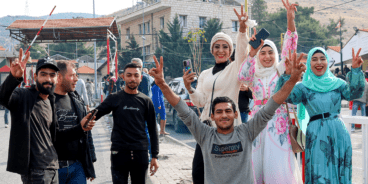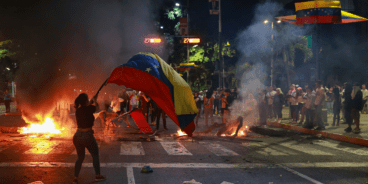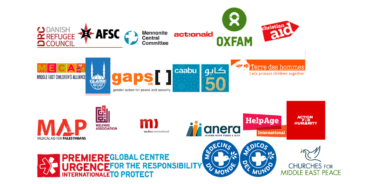
High-Level Panel Discussion Dedicated to the 65th Anniversary of the Genocide Convention
The high-level panel discussion dedicated to the 65th anniversary of the Convention of the Prevention and Punishment of the Crime of Genocide took place in the United Nations (UN) Human Rights Council on 7 March 2014. It was followed by an interactive dialogue with the Special Adviser of the Secretary-General on the Prevention of Genocide, Adama Dieng.
During the debate, sixteen states made references to Responsibility to Protect (R2P). The UN High Commissioner for Human Rights, Navi Pillay, Special Adviser Dieng, the Senior Advisor to the task force for dealing with the past and prevention of atrocities of the Swiss Federal Department of Foreign Affairs, Jonathan Sisson, and representatives of the European Union also referred to R2P in their statements.
Sixteen Member States Referenced R2P
-
-
- High-level panel: Australia, Belgium, Egypt, Hungary, Liechtenstein, Morocco, Netherlands, New Zealand, Portugal, Rwanda, Sierra Leone, Slovenia and Spain.
- Interactive Dialogue: Ireland, Mexico and Turkey.
-
Liechtenstein also called for voluntary restraint on the use of the veto by the permanent members of the UN Security Council in mass atrocity situations.
References to the Responsibility to Protect
High-Level Panel
Ms. Navi Pillay, UN High Commissioner for Human Rights
“My Office, which benefits from information gathered by field presences in more than 60 countries, by the UN Country Team and civil society actors, has not shied away from speaking out when there is a risk of genocide or mass atrocity. In this regard, I welcome our close cooperation with the Office of the Secretary-General’s Special Advisers on the Prevention of Genocide and the Responsibility to Protect.”
Mr. Adama Dieng, Special Adviser of the UN Secretary-General on the Prevention of Genocide
“The Genocide Convention was the first human rights treaty of the United Nations system. This speaks to the significance of the Convention. In addition to setting out the norms related to the punishment of the crime of genocide, I believe that one of the most important contributions of the Convention is the norm that establishes the responsibility to prevent genocide.
[…] In 2005, Member States made a landmark commitment at the World Summit, articulated in paragraphs 138 and 139 of the Outcome Document. In this document, all Heads of State and Government affirmed their responsibility, both individual and collective, to protect populations by preventing genocide war crimes, ethnic cleansing and crimes against humanity, including their incitement. As each of the five annual reports of the Secretary-General on the responsibility to protect has underlined, preventive action lies at the core of the three pillars of the responsibility to protect.
[…] In Europe, too, States have taken initiatives aimed at the prevention of atrocity crimes, including through the creation of inter-agency arrangements or nomination of focal points on the responsibility to protect or on the prevention of genocide. A meeting of States that have appointed these focal points has just taken place in Costa Rica, with the participation of 53 countries.”
Mr. Jonathan Sisson, Senior Adviser, Task Force on Dealing with the Past and Prevention of Atrocities, Human Security Division, Swiss Federal Department of Foreign Affairs
“Secondly, I draw attention to an important event on the topic of prevention and protection that has taken place this week in Central America. At the initiative of Argentina, Costa Rica, Denmark, Switzerland, and Tanzania, and in cooperation with the office of the Special Advisers on the Prevention of Genocide and the Responsibility to Protect, representatives of 56 UN member states gathered in San José for the first international meeting of the ‘Global Action Against Mass Atrocity Crimes’ (GAAMAC).”
Sierra Leone
“Mr. President, while international efforts designed to prevent and punish genocide, such as the development of early warning signs, development of the responsibility to protect doctrine and creation of the International Criminal Court are fundamentally important, my delegation also wishes to stress its support for the importance of addressing the root causes of genocide at the national level.”
European Union
“Another landmark was the World Summit in 2005, when all States unanimously recognized the Responsibility to Protect. According to the World Summit Outcome Document, each individual State has the responsibility to protect its populations from genocide, war crimes, ethnic cleansing and crimes against humanity. […] Therefore, the three pillars of R2P consist of prevention, cooperation and timely and decisive response, and they are all mutually reinforcing. The EU considers that prevention is at the core of the concept and strongly believes that mainstreaming prevention in the UN framework is of utmost importance.
[…] The recommendations of the European parliament in April 2013 and the enlargement of the European R2P focal point network, as well as the Report on the EU capabilities to prevent mass atrocities and the targeted training of national administrators sponsored by the Budapest Centre for the International Prevention for Genocide and Pass Atrocities have also contributed to translating the Responsibility to protect into practice.
The EU firmly supports the mandate of the Special Adviser on the Prevention of Genocide as well as the Special Adviser on the R2P and welcomes the SG’s plan of action ‘Rights up Front’ as a means of making the UN more effective in preventing mass atrocities.”
Australia
“Australia is also a strong supporter of the responsibility to protect, which recognises the responsibility we all share to protect vulnerable populations from mass atrocity crimes, including genocide.
One step that all States can take is to appoint their own national Focal Points to coordinate and lead activities at the national level, and work collectively internationally to prevent mass atrocity crimes such as genocide. Australia has had a National Focal Point since 2011 and has recently joined the ‘GAAMAC initiative’ which seeks to bring together R2P and genocide prevention focal point networks. We would encourage all states to appoint a national representative to join the expanding network of R2P, genocide and atrocity prevention focal points.”
Portugal
“Each individual State has the responsibility to protect its populations from genocide and the UN system has the responsibility to use the appropriate means, in accordance with the Charter, and to assist States when appropriate.”
New Zealand
“As agreed at the 2005 World Summit and subsequent debates on Responsibility to Protect, prevention is an essential pillar of the global response. That responsibility lies first with national governments and institutions, but often improved capacity for prevention is needed, and here the international community can and should provide support.”
Egypt
“States should fulfill their responsibilities to protect populations and to meet their obligation to take all possible measures to prevent and punish the crime of genocide. We also reiterate our steady commitment to combating impunity and promoting democracy, the rule of law and good governance.”
Rwanda
“Lastly, I would be remiss if I failed to recognize the valuable work done by the Office of the Advisers of the Secretary-General on the Prevention of Genocide and on the R2P to prevent genocide particularly through early warning.”
Morocco
“Morocco, who takes active part in the debates on the concept of R2P in the General Assembly in New York, is concerned about a consensual operationalization of this concept, in order to allow for better collective action in cases of genocide, crimes against humanity, war crimes and grave violations of human rights.”
Slovenia
“The universally adopted concept R2P in 2005 further affirmed the multi-tier responsibility to protect populations from genocide, war crimes, ethnic cleansing and crimes against humanity.”
The Netherlands
“Genocide prevention is part of the Netherlands policy for the protection of civilians in line with the principle of R2P. Therefore, we have appointed a focal point on R2P and work on putting this principle into practice.”
Spain
“Prevention is the basis of the concept of R2P, universally recognized by the Heads of State and Government gathered in the World Summit of 2005. State sovereignty does not only imply rights, but also the obligation of States to protect people on their territory who very grave violations of human rights. […] The three pillars of R2P are equally important.”
Liechtenstein
“As we commemorate the 65th anniversary of the Genocide Convention, we must continue to strive for its universal membership. More importantly, we must do more to implement the Convention. This is an essential part of our responsibility to protect civilian populations from atrocity crimes. We pay tribute to the victims of the Rwandan genocide 20 years ago. The genocide in Rwanda was one of the worst failures of the international community: a failure to communicate information and to act upon it, a failure to prevent crimes, a failure to intervene and to protect.
[…] But more change is needed. Most importantly, the Security Council must finally live up to its responsibility to protect populations from atrocity crimes. This requires a serious change in the way in which permanent members employ the veto. It is unconscionable that the narrow national interests of one or more States should prevent the UN from taking meaningful action to protect civilian populations. We therefore applaud the initiative by France advocating for a code of conduct that would effectively prevent the use of the veto in such situations. We are working within the so-called ACT group in New York as well as with interested Members of the Council to turn this ambitious idea into reality.”
Belgium
“That’s why Belgium supports fully the efforts of the Joint Office of the Advisers of the Secretary-General on the Prevention of Genocide and on the R2P in reinforcing UN early warning mechanisms and national prevention capacities. We encourage all states to appoint a national focal point for R2P.”
Hungary
“Among the various initiatives launched by the Budapest Centre I would like to highlight the report prepared in 2013 on the EU capabilities to prevent mass atrocities, 4 the multi-annual project to develop skills of national administrations to prevent genocide and operationalize the R2P, and the efforts for supporting the implementation of the mandate of the Advisers of the Secretary-General on the Prevention of Genocide and on the R2P.”
Ireland (statement prepared, but not delivered due to lack of time)
“[W]e underline our strongest commitment to the principle of the responsibility to protect, enshrined in the World Summit outcome document of 2005, which has become the vanguard in this international effort. In our view, the concept of R2P has prevention at its very core. Prevention, including by means of building the resilience of states to atrocity crimes, is a continuing imperative.”
Mr. Adama Dieng, Special Adviser of the UN Secretary-General on the Prevention of Genocide
“On the question of R2P, how do you promote R2P, I’m glad that many member states are continuing to support the R2P, we have the Group of Friends in New York, and personally of course I work very closely with my colleague Special Adviser Jennifer Welsh on the R2P, reminding states of the responsibility whenever concerns arise and also supporting states to build national capacity to protect populations and it is within that framework that I was very pleased to support the very recent GAAMAC meeting in Costa Rica.”
Interactive Dialogue
Mr. Adama Dieng, Special Adviser of the UN Secretary-General on the Prevention of Genocide
“When a State takes the initiative to engage with my mandate, it shows openness to reflection and an acknowledgement of its own responsibility. Assuming that responsibility is the first step – and the first pillar of what is known as the principle of the responsibility to protect.”
European Union
“Since the adoption of the Genocide Convention, in 2005, the member states of the UN, collectively committed themselves to protect populations from genocide, war crimes, ethnic cleansing and crimes against humanity. The R2P, with its three pillars, as laid out in the World Outcome Document, has been the most important development in the effort to prevent genocide.
The EU attaches utmost importance to the principle of R2P and its three pillars, which are all essential for the realization of R2P. There is no hierarchy between the three pillars whose main internal connecting link is prevention. There have been many discussions in the General Assembly to advance this principle as well as efforts at global level, such as the Global Network of R2P Focal Points, which constitute a proof that the R2P has assumed a central role in our discussions.
However, the main question is how we can ensure the realization of the R2P and prevention in peaceful times; how to put this principle fully into practice. […]
There have been some efforts to have the R2P addressed by the Human Rights Council, but in our view, as the main UN human rights body, the Council must contribute more effectively in promoting R2P.”
Mexico
“The responsibility of each State to protect its population from genocide includes, to conclude, the prevention of these crimes.”
Ireland
“The prevention of genocide is central to all three pillars of the R2P. Genocide poses an enormous moral challenge to the international community.”
Turkey
“We agree that while the primary responsibility for the protection of its population lies with the state, we have a collective responsibility to respond to crisis.”
List of Speakers
High Level Panel
- UN High Commissioner for Human Rights, Ms. Navi Pillay
- Republic of Armenia, Minister of Foreign Affairs, H.E. Mr. Edward Nalbandian
- Sociologist, author and the Rwanda Genocide survivor, Ms. Esther Mujawayo
- Special Adviser of the UN Secretary-General on the Prevention of Genocide, Mr. Adama Dieng
- Republic of Guatemala , Attorney General, Ms. Claudia Paz y Paz
- Switzerland, Federal Department of Foreign Affairs, Task force for dealing with the past and prevention of atrocities, Mr. Jonathan Sisson
- Documentation Center of Cambodia, Mr. Youk Chhang
- Sierra Leone, Ms. Yvette Stevens
- European Union, Mr. Nicole Reckinger
- Ethiopia (on behalf of African Group), Mr. Minelik Alemu Getahun
- Cuba (on behalf of 14 “like-minded” countries), Mr. Abelardo Moreno Fernández
- Argentina, Mr. Alexis Am
- Estonia, Mr. Yuri Seilenthal
- Chile, Mr. Patricio Utreras
- Turkey, Mr. Ferden Çarikçi
- Brazil, Mr. Joao Lukas Quental Novaes De Almeida
- Australia, Mr. Peter Woolcott
- Montenegro, Ms. Zorica Maric Djordjevic
- Portugal, Ms. Manuela Teixeira
- Indian Council for South America, Mr. Ronald Barnes
- World Environment and Resources Council, Mr. Aadish Jain
- European Union of Public Relations, Ms. Marjolaine Rion
- Sociologist, author and the Rwanda Genocide survivor, Ms. Esther Mujawayo
- Special Adviser of the UN Secretary-General on the Prevention of Genocide, Mr. Adama Dieng
- Switzerland, Federal Department of Foreign Affairs, Task force for dealing with the past and prevention of atrocities, Mr. Jonathan Sisson
- Costa Rica (on behalf of the Community of Latin American and Caribbean States)
- New Zealand, Ms. Amanda Ellis
- Egypt, Mr. Amr Essam
- Rwanda, Mr. Moses Rugema
- Morocco, Mr. Amine Chabi
- Azerbaijan, Mr. Ismayil Asadov
- International Committee for the Red Cross, Ms. Anne-Marie La Rosa
- Poland, Mr. Jerzy Baursky
- Venezuela (Bolivarian Republic of), Mr. Edgardo Toro Careño
- Slovenia, Mr. Vojislav Šuc
- Netherlands, Mr. Reinout Vos
- Spain, Mr. Vicente Cacho
- International Association of Jewish Lawyers and Jurists, Ms. Tom Gal
- International Organization for the Elimination of All forms of Racial Discrimination, Ms. Entisar AlObady
- Algeria, Mr. Saadi Ahmed
- United States of America, Mr. David Sullivan
- Liechtenstein, Mr. Peter Matt
- Sudan, Ms. Khadija Elfadil
- Belgium, Ms. Daniella Haven
- Madagascar, Ms. Annick H. Andriamampanina
- Hungary, Mr. Andras Dekany
- Sociologist, author and the Rwanda Genocide survivor, Ms. Esther Mujawayo
Interactive Dialogue
- Special Adviser of the UN Secretary-General on the Prevention of Genocide, Mr. Adama Dieng
- European Union, Ms. Nicole Miller
- Morocco, Mr. Amine Chabi
- Ethiopia (on behalf of the African Group)
- United States of America, Ms. Lisa Brodey
- China
- Australia, Ms. Emily Hill
- Mexico, Ms. Gisele Fernández Ludlow
- Bangladesh, Ms. Nahida Sobhan
- Armenia, Ms. Karine Soudjian
- Ireland, Mr. James C .O’Shea
- Ecuador, Ms. Analucía Jácome
- Turkey, Mr. Sait Uyanik
- Pasumai Thaayagam Foundation, Ms. Dhamayanthi Rajendra
- France Libertes: Fondation Danielle Mitterrand, Ms. Oretta Bandettini Di Poggio
- International Organization for the Elimination of All forms of Racial Discrimination – Geneva International Centre for Justice (Joint Statement)
- Special Adviser of the UN Secretary-General on the Prevention of Genocide, Mr. Adama Dieng
- Iraq, Mr. Mohamed Shyaa Al-Sudani (Right of Reply)
Related Content


